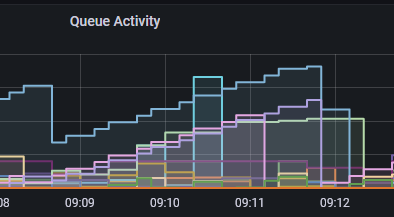My previous post was about one small project I got involved with over the last week. This is another one prompted by working with an MQ user, this time to do with metrics. Essentially they had an urgent need to do some basic MQ queue rate monitoring: how many messages were put/got in an interval. More sophisticated observability, whether using a product like Instana, or tools such as these, would be a later exercise. I described what MQ can generate, and what some of the provided sample programs do, but decided it was more interesting to demonstrate it with real running code.
I also think of this as the coding version of the “Yes, And …” rule for Improv. Start with one piece and see where it leads. I ended up with 3 pieces – collect data, format data, display data. Each piece had some utility on its own, but I then thought “Yes, and then what can I do to demonstrate the next phase most effectively.”
Continue reading “Snippet 2 – Basic MQ Queue Rate monitoring”This post was last updated on November 15th, 2022 at 12:41 pm
